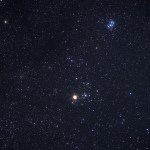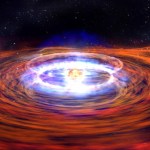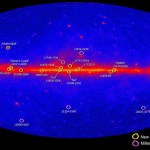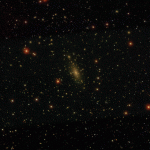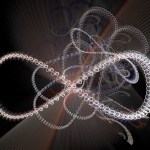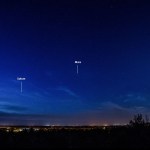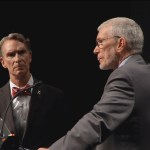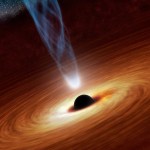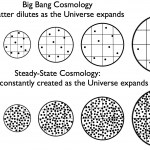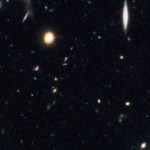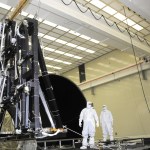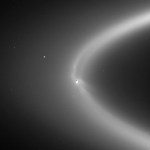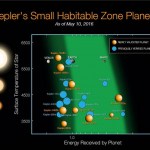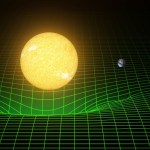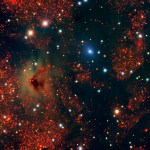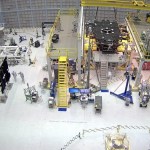Astronomy
“Finding out that something you have just discovered is considered all but impossible is one of the joys of science.” -Mike Brown
In January of last year, astronomers Konstantin Batygin and Mike Brown shocked the world by proposing that there was a world larger than Earth located some five-to-ten times as distant as Neptune. That this world — known as Planet Nine — was causing the ultra-distant Kuiper belt objects we'd discovered so far to all have predicable, peculiar properties. And the observations matched up really well.
The 3D orbits of the Kuiper belt objects influenced by Planet Nine…
"We find them smaller and fainter, in constantly increasing numbers, and we know that we are reaching into space, farther and farther, until, with the faintest nebulae that can be detected with the greatest telescopes, we arrive at the frontier of the known universe." -Edwin Hubble
When you look out at the distant Universe, you can see all sorts of things: stars, galaxies, clusters of galaxies, going as far back into the distant past as our telescopes can image. But where you have the greatest concentrations of mass, an extreme phenomenon emerges: that of gravitational lensing. Any foreground…
"End? No, the journey doesn't end here. Death is just another path, one that we all must take. The grey rain-curtain of this world rolls back, and all turns to silver glass, and then you see it." -J.R.R. Tolkien
Stars live for a variety of ages, from just a million or two years for some to tens of trillions of years for others. But even after a star has run out of its fuel and died, its stellar corpse continues to shine on. Neutron stars and white dwarfs are both extremely massive, but very small in volume compared to a star. As a result, they cool very slowly, so slow that a single one has…
"Two recent studies by teams in the U.S. and the Netherlands have shown that the gamma-ray excess at the galactic center is speckled, not smooth as we would expect for a dark matter signal. Those results suggest the speckles may be due to point sources that we can’t see as individual sources..." -Eric Charles
When NASA’s Fermi satellite began operations, it didn’t take long before we had constructed the most accurate, comprehensive gamma ray map of the galaxy. While many outstanding astrophysics findings ensued, including the discovery of many new pulsars, there was one particular mystery…
"There is always a heavy demand for fresh mediocrity. In every generation the least cultivated taste has the largest appetite." -Paul Gauguin
From our vantage point within the Milky Way, it sure does appear impressive. Hundreds of billions of stars shine in our own cosmic backyard, with our galaxy spanning a whopping 100,000 light years from end-to-end. Yet not only is that small compared to our nearest large neighbor, Andromeda, but it’s not even 20% as large as the largest spiral galaxies we find.
Severely disrupted galaxies, like NGC 6872, can extend for many times farther than a quiet…
“Time travel used to be thought of as just science fiction, but Einstein's general theory of relativity allows for the possibility that we could warp space-time so much that you could go off in a rocket and return before you set out.” -Stephen Hawking
As always, there's been a new fantastic week of articles here at Starts With A Bang, punctuated by our new podcast this month, on the physics of time travel!
Have a listen (or download it and take it with you) and thank our Patreon supporters for making it possible! Now, what was this past week all about? Come enjoy some fabulous stories…
"I long ago abandoned the notion of a life without storms, or a world without dry and killing seasons. Life is too complicated, too constantly changing, to be anything but what it is. And I am, by nature, too mercurial to be anything but deeply wary of the grave unnaturalness involved in any attempt to exert too much control over essentially uncontrollable forces." -Kay Redfield Jamison
Under ideal conditions, Mercury achieves a maximum elongation, or angular separation, from the Sun of 28 degrees. Total darkness is achieved when the Sun dips 18 degrees below the horizon. So for many of us,…
"You must remember, my dear lady, the most important rule of any successful illusion: First, the people must want to believe in it." -Libba Bray
There are many times throughout history that science -- and scientists -- have gotten it wrong. And there are many topics today that are quite polarized, from the Big Bang and evolution to vaccines, fluoridation, chemtrails and climate change. There are many public debates that play out, sometimes in nasty ways, surrounding all of these topics.
A Nigerian health worker tries to immunise a child during vaccination campaign against polio. The…
"A few centuries ago, the pioneer navigators learnt the size and shape of our Earth, and the layout of the continents. We are now just learning the dimensions and ingredients of our entire cosmos, and can at last make some sense of our cosmic habitat." -Martin Rees
You might think that Jupiter is the largest planet in the Solar System because it’s the most massive, but that’s not quite right. If you kept adding mass to Saturn, it would get larger in size, but if you kept adding mass to Jupiter, it would shrink! For a given set of elements that your planet is made out of, there’s a maximum…
“It is conceptually interesting, if not astrophysically very important, to calculate the precise apparent shape of the black hole... Unfortunately, there seems to be no hope of observing this effect.” -Jim Bardeen
Black holes were one of the first consequences of general relativity that were predicted to exist, and the more we’ve studied the Universe, the more interesting they’ve become. We’ve calculated their physical sizes, their effects on the curvature of spacetime, their apparent angular sizes, and the properties of matter that gets caught in an accretion disk around them. But we’re…
"You couldn’t be here if stars hadn’t exploded, because the elements - the carbon, nitrogen, oxygen, iron, all the things that matter for evolution and for life - weren’t created at the beginning of time. They were created in the nuclear furnaces of stars, and the only way for them to get into your body is if those stars were kind enough to explode..." -Lawrence Krauss
Throughout the 1940s, 50s and even 60s, a debate as to the origin of the Universe raged in astrophysics. Was the Big Bang theory, where the Universe emerged from a hot, dense state some finite time ago, or the Steady-State…
"We’ve taken a major step back in time, beyond what we’d ever expected to be able to do with Hubble. We see GN-z11 at a time when the universe was only three percent of its current age." -Pascal Oesch
Arriving at our eyes after a journey of 13.4 billion years, the light from galaxy GN-z11 has been traveling towards us for 97% of the Universe’s present age. It’s detection and discovery, however, was a lot more complicated than simply opening up your telescope’s eyes and collecting enough light; a confluence of four separate things needed to happen all at once to make it possible.
Schematic…
"Resources exist to be consumed. And consumed they will be, if not by this generation then by some future. By what right does this forgotten future seek to deny us our birthright?" -Sid Meier's Alpha Centauri
The dream of humanity has long been to identify an inhabited world beyond Earth, to know for certain that life is not unique to our pale blue dot. If we were located a great distance away, there are observations of Earth we could make that would tell us a tremendous amount of information about our world, including about its oceans, clouds, continents, the "greening" of our…
"Hey, if our eyes could access the infrared part of the light spectrum, the sky would be green and trees would be red. Some animals see in completely different ways, so who knows what colors look like to them. Nothing is really how we perceive it." -Wendy Mass
If you take a look at the James Webb Space Telescope, the most visually striking feature of all is the gold mirrors. Yet gold would make an absolutely terrible material for constructing these mirrors! For very sound scientific reasons, the vast majority of these mirrors are made out of beryllium, not gold, and gold doesn't even enter…
"Aha! That satellite was scuttled on Enceladus, Saturn's main dump moon!" -Professor Farnsworth, Futurama
When you think about life beyond Earth, you likely think of it occurring on a somewhat Earth-like planet. A rocky world, with either a past or present liquid ocean atop the surface, seems ideal. But that might not even be where life on Earth originated! Deep beneath the Earth’s surface, geologically active hydrothermal vents currently support diverse colonies of life without any energy from the Sun. Saturn’s icy moon, Enceladus, has a subsurface ocean unlike any other world we’ve yet…
"You can spend too much time wondering which of identical twins is the more alike." -Robert Brault
When we think of the idea of “Earth’s twin,” we inevitably think of a planet like ours orbiting a star like ours at the same distance and speed. Most planets are not rocky and Earth-sized; most stars are not like the Sun; most planetary orbits don’t have Earth’s orbital parameters. Yet the idea that a twin of our planet is out there, and that’s the most likely place to look for life, persists.
Although many of the Earth-like candidates from Kepler are close to Earth in physical size, they…
"I much prefer the sharpest criticism of a single intelligent man to the thoughtless approval of the masses." -Johannes Kepler
There are a lot of myths we have in our society about how the greatest of all scientific advances happened. We think about a lone genius, working outside the constraints of mainstream academia or mainstream thinking, working on something no one else works on. That hasn’t ever really been true, and yet there are actual lessons – valuable ones – to be learned from observing the greatest of all scientists throughout history.
The gravitational behavior of the Earth…
"Things need not have happened to be true. Tales and adventures are the shadow truths that will endure when mere facts are dust and ashes and forgotten." -Neil Gaiman
Wherever we look in the night sky, we don't just observe the background sources of light shining our way, but also the effects of all the matter in between those distant sources and our eyes. Since all of that inbound light needs to pass through a portion of the Milky Way on its way to our eyes, it's vital that we understand how that light is distorted by our own galaxy. That means we need an understanding of the dust in our own…
“For me, it is far better to grasp the Universe as it really is than to persist in delusion, however satisfying and reassuring.” -Carl Sagan
The President of the United States just released his proposed budget for the next fiscal year, and there are some big losers in the scientific world. The EPA, the NIH, NASA Earth Science and many other organizations that exist for the benefit of America and all of humanity are poised to lose a significant amount of federal funding. This doesn't simply affect the scientists who lose their jobs.
A significant fraction of the scientists and engineers…
“Without these supernova explosions, there are no mist-covered swamps, computer chips, trilobites, Mozart or the tears of a little girl. Without exploding stars, perhaps there could be a heaven, but there is certainly no Earth.” -Clifford A. Pickover
One of the most sobering cosmic truths is that every star in the Universe will someday run out of fuel and die. Once its core fuel is exhausted, all it can do is contract under its own gravitational pull, fusing heavier and heavier elements until it can go no further. Only the most massive stars, capable of continuing to fuse carbon (and even…
